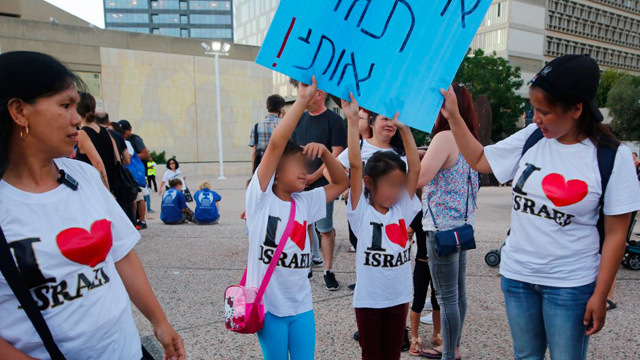Born in Israel, hundreds of Filipino children risk expulsion

ISRAEL IS HOME. Filipino children carry a banner which reads in Hebrew 'Don't deport me' during a protest against deportation in Tel Aviv on August 6, 2019. Photo by Gil Cohen-Magen/AFP
TEL AVIV, Israel – In the heat of the summer, Sivan Noel and her sister Michal say they rarely venture outside of their family's small, basement apartment in Tel Aviv.
The two girls, 11 and 9, risk being deported to the family's home country, the Philippines, even though they've never set foot there.
"I was born here," said Sivan, the 11-year-old.
"It's really unfair that after being born here and having a family, friends, school and studies, we are being told that... we now must leave to a place that we hardly know."
They and hundreds of other Filipino families in Israel are caught up in a legal battle that has put them at risk of deportation.
Many of the 28,000 Filipinos in Israel arrived to work as caregivers and domestic helpers, but according to the United Children of Israel (UCI) association, some 600 families could now face expulsion over a loss of residency status.
The issue holds particular resonance in Israel, where there are long-term fears about maintaining a Jewish majority in the country founded as a national homeland for Jews in the wake of the Holocaust.
But children such as Sivan and Michal pose a special case.
They were born in Israel, attend school in the country, speak and write on social media in Hebrew and dress in the same tank tops, shorts and sandals as other children in Tel Aviv.
Their mother, Ramela Noel, arrived legally in the country in 2003 as a domestic worker.
She later met her husband, who is also Filipino, and became pregnant with Sivan, the oldest of the two girls.
She then faced a heartbreaking choice: either leave the country or send her child to the Philippines in order to maintain her visa, as spelled out in her employment contract.
'I started crying'
Noel said she initially chose to remain and send her child back to the Philippines to live with her sister, Sivan's aunt.
Comments